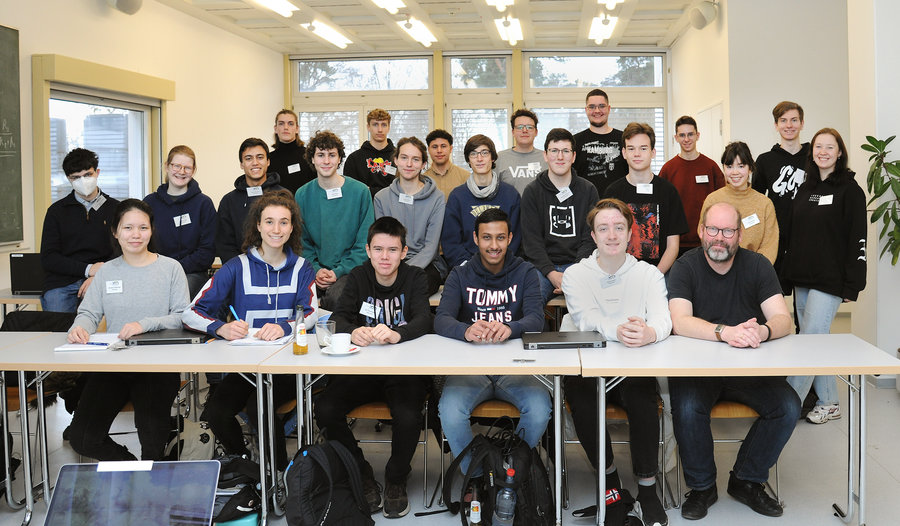Physicist for a day – ALICE Masterclass back on campus
28.02.2023 |
The Masterclass is back on campus! In February, twenty interested students had again the opportunity to analyze data from the ALICE experiment at the CERN research center in a Masterclass, this time on site at GSI/FAIR. The event was organized by scientists of GSI/FAIR’s ALICE research department.
In the framework of the ALICE Masterclass, the students were able to gain an insight into the scientific work and data analysis . Under the expert guidance of the scientists on site, they analyzed the ALICE experiment data taken in proton-proton collisions as well as collisions of lead nuclei. To conclude the day of research, they discussed their results with other participants in a joint video link to other research institutions. A virtual visit to the ALICE measurement setup at CERN, as well as an on-site visit to the linear accelerator UNILAC and the large experiment HADES on the GSI/FAIR campus was also part of the day's program.
“I was excited by the unique opportunity to work with real measurement data from ALICE, and in such an impressive environment as GSI,” says Masterclass participant Nico Moch, who traveled from North Rhine-Westphalia especially for the event. “It was a fascinating insight into the beginnings of our universe for me.”
ALICE is one of the four large-scale experiments at the LHC collider at the CERN research center in Geneva and deals in particular with heavy ion collisions of lead atomic nuclei. When lead atomic nuclei collide with unimaginable impact in the LHC, conditions are created similar to the first moments of the universe. During the collisions, a so-called quark-gluon plasma is created for a very short time - a state of matter that existed in the universe shortly after the Big Bang. This plasma transforms back into normal matter within fractions of a second. The particles produced in the process provide information about the properties of the quark-gluon plasma. Thus, the measurements can peer into the birth of the cosmos and reveal information about the basic building blocks of matter and their interactions.
The relationship between GSI and ALICE is traditionally very close: The two large ALICE detector systems Time Projection Chamber (TPC) and Transition Radiation Detector (TRD) were designed and built with significant contributions of GSI’s ALICE department and Detector Laboratory. Today scientists from both departments focus on the TPC, which is the centerpiece for track reconstruction in the central ALICE barrel setup and is also indispensable for particle identification. Scientist from GSI's IT department contribute strongly to the new data acquisition and analysis software O2, and the GSI computer center is an integral part of the computer network for data analysis of the ALICE experiment.
The Masterclasses are organized by the IPPOG (International Particle Physics Outreach Group), of which GSI is an associate member. Each year, more than 13,000 students from 60 countries take part in the events of about 225 universities or research centers for a day to unlock the mysteries of particle physics. All events in Germany are held in collaboration with the Netzwerk Teilchenwelt, of which GSI/FAIR is a member. The goal of the nationwide network for communicating particle physics to young people and teachers is to make particle physics accessible to a broader public. (CP)
Further information
- Masterclasses at GSI/FAIR (German)
- Physics Masterclasses of the IPPOG
- Research department ALICE at GSI/FAIR
- ALICE Collaboration














